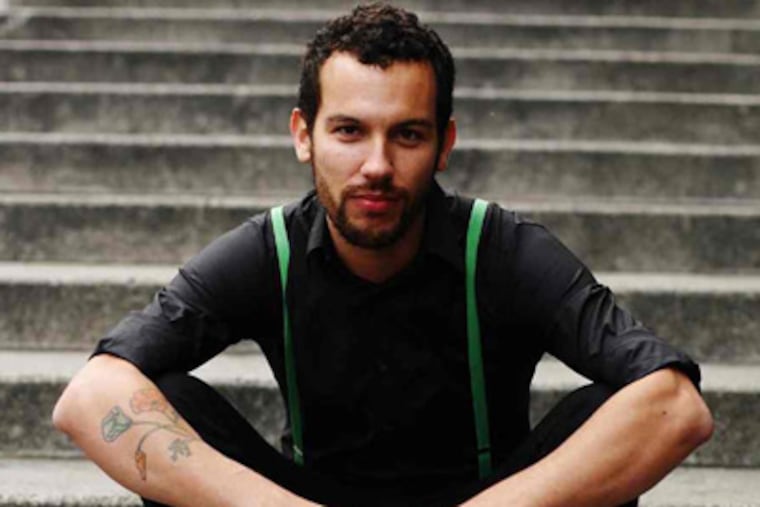Howls of praise
First-time novelist Justin Torres' slim coming-of-age tale explodes off the page, and in critical reviews.

Justin Torres is living the first-time novelist's ultimate fantasy: His stunning debut, the slim, sparse, poetic semiautobiographical coming-of-age story We the Animals (Houghton Mifflin Harcourt; $18), which was released Aug. 30, has been met with universal acclaim.
Such is the love pouring Torres' way that publisher Houghton Mifflin Harcourt has sent forth the 31-year-old author on a 20-city tour to promote the book. It's a remarkable move, even for established authors, and especially in this economy. (Torres will be at Giovanni's Room in Center City Tuesday at 5:30 p.m.)
The buzz has been electric.
Otherwise stuffy critics are doing verbal cartwheels. Slick magazines' otherwise slender book review pages are teeming with flights of extravagant, fanciful praise.
We the Animals "rumbles with lyric dynamite," says Esquire. "A gorgeous, howling coming-of-age novel that will devour your heart," proclaims Vanity Fair. "It makes you reexamine what it means to love and to hurt," posits Oprah's ever-solicitous mag, O.
Torres finds it all extraordinary. And amusing. "I've just been like trying to handle it all. . . . I never expected any of it in my wildest dreams," he says, on the phone after a reading in Washington. "I'm just trying, racing, to catch up."
It's a fast pace after the six years it took Torres to write We the Animals.
At 125 pages, the novel is slim. But it packs a serious punch: Torres' meticulously composed prose is coiled so tight, so compact, and so precise that it explodes off the page.
Made up of short fragments gathered under enigmatic chapter titles, We the Animals is "more like looking through a photo album than it is a traditional novel," Torres says.
Based in large part on the author's life, We the Animals follows the trials and tribulations of a young, mixed-race, lower-middle-class couple - he's Puerto Rican, she's white - who married in their teens and who are struggling to raise three sons.
Narrated by the sensitive, intelligent youngest son, the novel chronicles how the parents' passionate if volatile bond with each other and with their boys often turns destructive. And it shows in heartbreaking detail how the unnamed narrator begins to feel increasingly alienated from his father and brothers as he discovers his budding homosexuality.
Torres insists that while the fictional family closely mirrors his own, most of the events in the novel are either fabricated or heavily dramatized, especially the disturbing final chapters.
Torres says he's especially nervous about a particular stop on his book tour - his hometown, Baldwinsville, a rural enclave near Syracuse, N.Y.
Won't it feel like a conquering hero's triumphant return home?
Torres, who lives in San Francisco and teaches writing at Stanford University as a two-year Wallace Stegner Fellow, pauses for a few beats. Is he relishing the moment to come? Or dreading it?
Both, says Torres, whose life as a gay Latino high school student in an otherwise white town ("we were the only Puerto Ricans for a 30-mile radius") wasn't exactly picture-perfect. Torres, who has a Puerto Rican father and an Italian-Irish mother, faced a great deal of cruelty at the hands of his peers.
"I don't feel like the place was particularly kind to me," he says. "It was fairly obvious to lots of people I was queer. I was really shy and I didn't play sports."
Torres says his peers were so threatened by him, they turned violent. "People pulled knives on me."
Torres' family life wasn't idyllic, either.
His father and brothers didn't take kindly to his budding sexuality. In an incident dramatized in the novel, Torres' parents committed the then-17-year-old to a psychiatric ward shortly after they discovered he was gay.
"I was betrayed by my family and I was really angry," Torres says. He has since repaired his familial bonds, he says. He says his mother "is my biggest supporter," though he and his father don't talk much.
Torres says once he finished high school, he promptly put Baldwinsville in his rearview mirror.
Though he admits he could "grind a few axes and bring up a lot of old grudges" when he returns, Torres says he feels more kindly toward the place now.
That's due to a great extent to his novel, which forced him to let go of some of the rage that had consumed him for years.
"I think that I began writing it in a way to get back to my family," Torres says. He soon discovered that writing in anger, and about nothing but anger, would get him nowhere.
"I had these great instructors," says Torres, who dropped out of New York University and later studied writing at the famed Iowa Writers' Workshop. They "told me, 'Look, you have to capture the fullest range of experience. You have to get the beauty and the grace' " as well as the tragedy in life.
Torres also learned there was little use in blaming his family or peers. He tries to express this in the book.
"It was really a struggle for me to get to the end of this book and to put the blame simultaneously on no one and on everyone at once," he says. "I think everyone is called out in the book. The same is true with the protagonist. I think he's as culpable as anyone. He's not a victim, he is an active member of what happens to him."